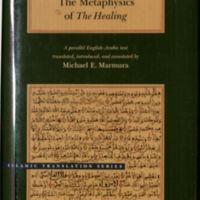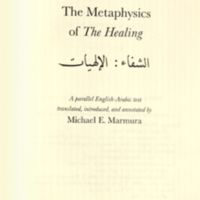The Metaphysics of The Healing: a parallel English-Arabic text = al-Ilahīyāt min al-Shifāʼ
Dublin Core
Title
The Metaphysics of The Healing: a parallel English-Arabic text = al-Ilahīyāt min al-Shifāʼ
Description
"Avicenna (Ibn Sina, 980-1037) was the most systematic, thorough, and influential of the Islamic philosophers. His Metaphysics (Al-Ilahiyyat) is the climactic, concluding part of his magnum opus, The Healing (Al-Shifa). As in his physics and mathematics, the existent is once again Avicenna's main subject in the metaphysics. But while in the physics he examines the existent inasmuch as it is subject to motion and rest, and in the mathematics inasmuch as it is quantified or relates to measure and quantity, in his metaphysics Avicenna deals with the existent as such - not inasmuch as it is either in motion or quantified, but simply inasmuch as it is an existent, without qualification. In addition, Avicenna here seeks to understand the cause of all things, which leads him, as it lead Aristotle before him, to a discussion of God. He develops an emanative theory of divine causation that represents a remarkable synthesis of Neoplatonic, Aristotelian, and Islamic ideas.
Within this emanative scheme we encounter some of the basic ideas of Avicenna's religious and political philosophy, including his discussion of the divine attributes, divine providence, the Hereafter, and the ideal, "virtuous" city with its philosopher-prophet as the recipient and conveyer of the revealed law, a human link between the celestial and the terrestrial worlds."--BOOK JACKET.
Creator
Avicenna
Publisher
Provo, UT : Brigham Young University Press
Date
2005
Contributor
translated, introduced, and annotated by Michael E. Marmura
Relation
Series: Islamic translation series.
Text Item Type Metadata
Original Format
Book
Citation
Avicenna, “The Metaphysics of The Healing: a parallel English-Arabic text = al-Ilahīyāt min al-Shifāʼ,” Humanities Hub, accessed February 28, 2026, https://humanitieshub.sdsu.edu/omeka/items/show/408.


